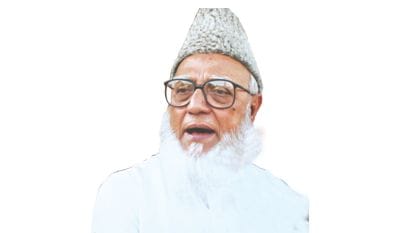Ghulam Azam incited genocide in '71

War crimes accused Jamaat-e-Islami former chief Ghulam Azam incited his men for committing genocide during the Liberation War in 1971, the prosecution yesterday told the International Crimes Tribunal-1.
The war crimes accused also made plans at different times as to how the auxiliary forces of the Pakistani army would operate their mission against freedom fighters in the nine-month war.
Prosecutor Sultan Mahmud Simon said these on the fourth day of closing arguments in the war crimes case against Ghulam Azam.
The prosecution's arguments were based on newspaper reports, documents and statements allegedly made by Ghulam Azam in 1971.
Ghulam Azam, ameer of East Pakistan Jamaat-e-Islami during the Liberation War, is facing five charges -- of conspiracy, planning, incitement, complicity, torture and murder -- of crimes against humanity.
Before placing his argument on incitement, Simon explained how the killing led by the auxiliary forces, like Peace Committee, Al-Badr, Al-Shams and Razakars, were genocide as per the Geneva Convention, 1948.
According to article 2 of the Geneva Convention, 1948, genocide means any of the following acts committed with intent to destroy, in whole or in part, a national, ethnic, racial or religious group, such as: (a) Killing members of the group; (b) Causing serious bodily or mental harm to members of the group; (c) Deliberately inflicting on the group conditions of life calculated to bring about its physical destruction in whole or in part; (d) Imposing measures intended to prevent births within the group; (e) Forcibly transferring children of the group to another group.
Simon said, “The incidents [killing of people] took place during the Liberation War in 1971 are genocide and he [Ghulam Azam] had direct involvement in these. It is not possible for him in anyway to avert the liabilities of it [genocide] as he had affiliation with politics and the army.â€
Ghulam Azam along with Jamaat's publicity secretary Moulana Nuruzzaman and another Jamaat leader Gholam Sarwar made a joint statement on April 7, 1971.
The statement reads: “India is interfering in the internal affairs of East Pakistan. Wherever patriotic Pakistanis see Indian agents or anti-Pakistan elements and infiltrators they will destroy them.â€
The prosecutor explained that Ghulam Azam referred activists of auxiliary forces as patriotic Pakistanis while freedom fighters as Indian agents or anti-Pakistan elements and infiltrators.
The Daily Azad ran the statement on its April 8, 1971, issues.
Ghulam Azam gave an inciting speech before the nation at Dhaka centre of Radio Pakistan on April 10, 1971. Three dailies, Azad, Purbadesh and Pakistan, ran stories on it the following day.
In the speech Ghulam Azam threatened the leaders of India and said India had always been involved in conspiracies to destroy Pakistan.
He also said by sending in “shoshostro onuprobeshkari (armed infiltrators)â€, India had in fact challenged the patriotism of East Pakistanis.
Simon said Ghulam Azam made such statement directly to incite people. “He did this on specific intention to incite people to commit genocide to destroy Hindu communities in part or as a whole,†he added.
On April 22, 1971, he called upon the activists of the Peace Committee to prevent anti-state elements (freedom fighters). He also directed his men to carry the national flag (of Pakistan) and aid the Pakistani army.
Daily Purbadesh published the news.
While placing arguments on the second charge (planning), Simon said Ghulam Azam along with like-minded leaders met then governor of East Pakistan Tikka Khan at the latter's house in Dhaka on April 4, 1971, where they proposed forming “Nagorik Committee†in order to support Pakistani occupation forces.
The committee was later formed with the name “peace committeeâ€.
Saying Ghulam Azam was aware of the March 25th mass killing, Simon argued that Ghulam Azam and the like-minded leaders had already planned to form the peace committee even before proposing the idea to Tikka Khan.
The peace committee was formed on April 9, 1971, and among the 125 members of the central peace committee, Ghulam Azam was third in rank, Simon said.
The peace committee led their operations in upazila and thana levels according to the direction of the central peace committee, said Simon adding that formation of such committees was the evidence of proper planning.
Showing East Pakistan Police Abstract of Intelligence Report, Simon said Ghulam Azam joined in a meeting with AQM Shafiqul Islam and Khwaja Khairuddin at a house on Elephant Road in Dhaka on May 4, 1971.
The report refers to Ghulam Azam's direct participation in planning against the Liberation War said the prosecution claiming that it had successfully proved charge-2.
The proceeding of the case was adjourned until February 24.
NIZAMI'S CASE
Defence counsel for war crimes accused Jamaat ameer Motiur Rahman Nizami yesterday crossed-examined freedom fighter Zahir Uddin Jalal, who testified against him on December 18 last year.
The defence counsel asked Jalal several questions on his operations and training.
In his testimony, Jalal had said Nizami asked a Pakistani army officer to have him killed along with martyred freedom fighter Rumi, son of Shaheed Janani Jahanara Imam, and musician Altaf Mahmud when they were detained at a camp during the Liberation War.
Rumi and Altaf never returned home while the witness was lucky to have escaped death as a Pakistan government official rescued him.
The proceeding of the case was adjourned until March 6. On that day, the defence would continue cross-examination of Jalal, who was popularly known then as Bichchhu Jalal.

 For all latest news, follow The Daily Star's Google News channel.
For all latest news, follow The Daily Star's Google News channel. 


Comments